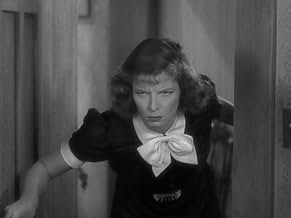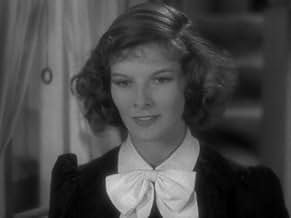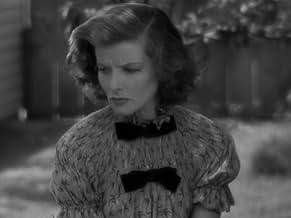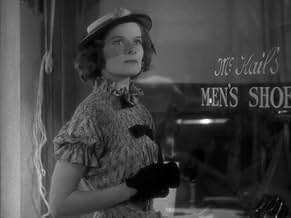CALIFICACIÓN DE IMDb
6.8/10
4.8 k
TU CALIFICACIÓN
Una socialita con apuros económicos navega su nuevo compromiso entre las restricciones impuestas por su familia y un padre inestable.Una socialita con apuros económicos navega su nuevo compromiso entre las restricciones impuestas por su familia y un padre inestable.Una socialita con apuros económicos navega su nuevo compromiso entre las restricciones impuestas por su familia y un padre inestable.
- Dirección
- Guionistas
- Elenco
- Nominado a 2 premios Óscar
- 4 premios ganados y 3 nominaciones en total
Hattie McDaniel
- Malena
- (as Hattie McDaniels)
Brooks Benedict
- Henrietta's Dance Partner
- (sin créditos)
Harry Bowen
- Laborer Putting Up Sign
- (sin créditos)
Steve Carruthers
- Party Guest
- (sin créditos)
Monte Carter
- Waiter at Restaurant
- (sin créditos)
George Ford
- Party Guest
- (sin créditos)
Joe Gilbert
- Party Guest
- (sin créditos)
Opiniones destacadas
When I first watched this film, despite the fact that George Steven's excellent direction makes a rather mundane plot into a very involving film, I was a bit thrown off by the actor who plays Katherine Hepburn's ailing father. About midway through the film I thought: "this guy's not much of an actor...".
However, by the time the film was over, I was completely captivated by the man, mostly due to his big confrontation scene with his boss near the end--in fact, I think I re-played that scene five times to really appreciate it's emotional power. And it is because of Mr. Fred Stone's performance in that scene that "Alice Adams" remains one of my very favorite films.
And who was the man? Well, anyone viewing "Alice Adams" is watching a rare document of American theatrical history. Fred Stone was born in 1873, actually traveled west with his family in a covered wagon, became a circus performer, acrobat, dancer, clown and expert "eccentric dancer." He knew Will Rogers and Annie Oakley, and became a MAJOR musical theater star in the early 20th-century. His most famous role was that of the ORIGINAL SCARECROW in the very first (1902) stage version of the WIZARD of OZ. As a young man Ray Bolger saw the production in Boston, and began to pursue his own "eccentric dancing" career, becoming immortalized himself as the Scarecrow in the 1939 MGM film.
In "Alice Adams", Fred Stone gives a remarkably sympathetic and honest performance, a simple, rather shy and utterly unpretentious Everyman, who, though convalescing from some undisclosed illness, must constantly endure the brow-beatings and guilt trips laid upon him by his nagging wife. By the end of the film, having become entangled in a business venture for which he seems totally unqualified and outraged by his son's thievery, he confronts his own boss in his living room for his big emotional scene. I remember reading in Mr. Stone's autobiography that George Stevens and Katherine Hepburn were so impressed by his performance in this scene that they actually EXPANDED his part in it to give him more screen time.
After Katherine Hepburn steps in to smooth things over with the boss, she has a final tender scene with Mr. Stone, one of those achingly beautiful scenes (with a lovely background score) that brings tears to the eye because of its sincerity and simplicity. You won't find anything like it in any film of the last 40 years--many imitations, yes---but not the REAL thing.
Oh yes, there's Katherine Hepburn too, in a role that requires her to act flighty and charming in an annoyingly overwrought way---a little of it goes a VERY long way. Still, she's lovely. Other stand-outs include Alice's smart-aleck brother, played by Frank Albertson, an appealing light comedy/musical theater guy BEST KNOWN for 2 roles: as Sam "hee-haw" Wainwright in "It's a Wonderful Life" and as the lecherous businessman who gives Janet Leigh the $40,000 in the second scene of "Psycho" (he really had aged a lot by 1959). Also, Charley Grapewin, best-known as Uncle Henry in the 1939 "Wizard of OZ" has a chance to shine as Mr. Stone's slightly cantankerous but generous and warm-hearted boss, Mr. Lamb.
"Alice Adams" is not for everyone; it's a low-key, genteel film about the problems of small-town people who are moving up in the social world and the one family that gets left behind. But thanks to George Steven's sensitive and compelling direction, the film transcends it very earthbound plot and becomes, at least for some of us, a very involving cinematic treasure.
However, by the time the film was over, I was completely captivated by the man, mostly due to his big confrontation scene with his boss near the end--in fact, I think I re-played that scene five times to really appreciate it's emotional power. And it is because of Mr. Fred Stone's performance in that scene that "Alice Adams" remains one of my very favorite films.
And who was the man? Well, anyone viewing "Alice Adams" is watching a rare document of American theatrical history. Fred Stone was born in 1873, actually traveled west with his family in a covered wagon, became a circus performer, acrobat, dancer, clown and expert "eccentric dancer." He knew Will Rogers and Annie Oakley, and became a MAJOR musical theater star in the early 20th-century. His most famous role was that of the ORIGINAL SCARECROW in the very first (1902) stage version of the WIZARD of OZ. As a young man Ray Bolger saw the production in Boston, and began to pursue his own "eccentric dancing" career, becoming immortalized himself as the Scarecrow in the 1939 MGM film.
In "Alice Adams", Fred Stone gives a remarkably sympathetic and honest performance, a simple, rather shy and utterly unpretentious Everyman, who, though convalescing from some undisclosed illness, must constantly endure the brow-beatings and guilt trips laid upon him by his nagging wife. By the end of the film, having become entangled in a business venture for which he seems totally unqualified and outraged by his son's thievery, he confronts his own boss in his living room for his big emotional scene. I remember reading in Mr. Stone's autobiography that George Stevens and Katherine Hepburn were so impressed by his performance in this scene that they actually EXPANDED his part in it to give him more screen time.
After Katherine Hepburn steps in to smooth things over with the boss, she has a final tender scene with Mr. Stone, one of those achingly beautiful scenes (with a lovely background score) that brings tears to the eye because of its sincerity and simplicity. You won't find anything like it in any film of the last 40 years--many imitations, yes---but not the REAL thing.
Oh yes, there's Katherine Hepburn too, in a role that requires her to act flighty and charming in an annoyingly overwrought way---a little of it goes a VERY long way. Still, she's lovely. Other stand-outs include Alice's smart-aleck brother, played by Frank Albertson, an appealing light comedy/musical theater guy BEST KNOWN for 2 roles: as Sam "hee-haw" Wainwright in "It's a Wonderful Life" and as the lecherous businessman who gives Janet Leigh the $40,000 in the second scene of "Psycho" (he really had aged a lot by 1959). Also, Charley Grapewin, best-known as Uncle Henry in the 1939 "Wizard of OZ" has a chance to shine as Mr. Stone's slightly cantankerous but generous and warm-hearted boss, Mr. Lamb.
"Alice Adams" is not for everyone; it's a low-key, genteel film about the problems of small-town people who are moving up in the social world and the one family that gets left behind. But thanks to George Steven's sensitive and compelling direction, the film transcends it very earthbound plot and becomes, at least for some of us, a very involving cinematic treasure.
This is an often under-rated film, and nowadays would certainly have been completely forgotten but for Katharine Hepburn's presence. As a satirical view of the 1920s filmed in the mid 1930s it feels somewhat dated. But not Hepburn's performance. This is is among the best of her RKO contract movies. Her innocence, her (modest) social pretension, her search for love, they all ring verosimilar - if not entirely true to life. And the celebrated window scene with tears and rain and sobs being one with Alice's feelings is far more than just 'clever'. Hepburn fans will like it. Others might very well follow along.
Have you ever picked up what you thought was a glass of water, but when you took a long sip you ended up with a mouthful of Sprite? A surprising feeling, but then you have to figure out if it's pleasant or not. I felt similarly about my experience watching "Alice Adams", George Stevens' 1935 film starring Katherine Hepburn as the title character. Expecting a wily romantic comedy, possibly a precursor to Hepburn's screwball comedies, I instead witnessed a beautiful, touching and sad film about rejection and romance in small-town America.
Alice is the daughter of a bookkeeper who is sick, and therefore temporarily out of work. Even before his unemployment, his job did not provide as much money for his family as many of Alice's contemporaries. This causes Alice to not be accepted in society, and makes it harder to find a boyfriend, though she tries to keep cheerful in front of her family. Unfortunately Mrs. Adams doesn't make things easier, by constantly harping on Mr. Adams to quit his job and be more ambitious. When the Palmers have their annual dance, Alice asks her brother Walter to take her, and there she first sees Arthur Russell MacMurray) a wealthy young man who is practically engaged to Mildred Palmer, probably the richest and most socially prominent young woman in the town. He notices Alice, and after a dance together, finds her a couple of days later and they begin a romance, but it becomes obvious that Alice is not going to be able to put up a façade of wealth and social acceptance for long, as their relationship becomes more serious.
There were so many times that I found myself just aching for Alice during this film. Booth Tarkington is so good at capturing the darker side of small town life without being obvious, that it is understandable that this film could be mistaken for a light romantic comedy, though in reality it was anything but. Alice's low self-esteem, mainly due to society's views on her more than her family's lack of money makes her such a fragile character that she becomes immediately sympathetic, and this is mainly due to Hepburn's performance. This was early in her career, and after seeing many of her later films it is easy to forget just how radiant and luminous she once was. She has always been one of my favorite actresses, but it was generally because of the strength she gave the characters she played throughout the years, not her fragility. "Alice Adams" was an extremely pleasant surprise, and I ended up absolutely loving it. A very solid 8/10.
--Shelly
Alice is the daughter of a bookkeeper who is sick, and therefore temporarily out of work. Even before his unemployment, his job did not provide as much money for his family as many of Alice's contemporaries. This causes Alice to not be accepted in society, and makes it harder to find a boyfriend, though she tries to keep cheerful in front of her family. Unfortunately Mrs. Adams doesn't make things easier, by constantly harping on Mr. Adams to quit his job and be more ambitious. When the Palmers have their annual dance, Alice asks her brother Walter to take her, and there she first sees Arthur Russell MacMurray) a wealthy young man who is practically engaged to Mildred Palmer, probably the richest and most socially prominent young woman in the town. He notices Alice, and after a dance together, finds her a couple of days later and they begin a romance, but it becomes obvious that Alice is not going to be able to put up a façade of wealth and social acceptance for long, as their relationship becomes more serious.
There were so many times that I found myself just aching for Alice during this film. Booth Tarkington is so good at capturing the darker side of small town life without being obvious, that it is understandable that this film could be mistaken for a light romantic comedy, though in reality it was anything but. Alice's low self-esteem, mainly due to society's views on her more than her family's lack of money makes her such a fragile character that she becomes immediately sympathetic, and this is mainly due to Hepburn's performance. This was early in her career, and after seeing many of her later films it is easy to forget just how radiant and luminous she once was. She has always been one of my favorite actresses, but it was generally because of the strength she gave the characters she played throughout the years, not her fragility. "Alice Adams" was an extremely pleasant surprise, and I ended up absolutely loving it. A very solid 8/10.
--Shelly
I had heard of the famous Tarkington novel (but not read it) and had known that Katherine Hepburn won the Best Actress Oscar for this. So, I rented it.
It's just so moving. What I think some of the negative reviewers forget is just how much a girl's prospects in a small town in the 1920s are determined by whom she marries. For the intelligent, lively, vibrant, charming, warm-hearted Alice Adams - with a pitifully weak (but very sympathetic) and rather poor father, Alice's chance to "make anything" of her life is determined socially.
My heart ached with the snubs Alice receives - the routine unthinking cuts she receives at the hands of those from "better" families. Wearing a two year old dress with a corsage of violets illegally picked from the park, her loutish brother in his old beaten-up borrowed car as her date, she tries SO HARD to fit in - and doesn't because no one will let her. It's the most opaque of glass ceilings.
If you've ever felt (at a job, a party, a family gathering) that there was nothing you could do - no matter how hard you tried - to fit in - yet it was important that you did, you'll feel so much for this charming girl.
I do agree with others that the Arthur Russell part is underwritten.
But the movie boring? Not on your life. The painful moments are more difficult to watch than most war movies in which the protagonist is killed - because it is so well-done -
-- the pains of humiliation borne within, the disability one cannot hide, the old dress, the rude and outrageous relation, the thwarted eagerness - these are far more likely to be the painful moments in one's life (that one does not wish to remember) than any actual bullet wounds.
I love how the movie does not show a saintly Alice - she would love to snub others (e.g., the chubby boy at the dance), would love to parade before others in finery. yet her warmth toward her family - her essential sweetness, her strong frustrated yearning - are completely captivating.
We love this girl - and because of that, we love the movie.
It's just so moving. What I think some of the negative reviewers forget is just how much a girl's prospects in a small town in the 1920s are determined by whom she marries. For the intelligent, lively, vibrant, charming, warm-hearted Alice Adams - with a pitifully weak (but very sympathetic) and rather poor father, Alice's chance to "make anything" of her life is determined socially.
My heart ached with the snubs Alice receives - the routine unthinking cuts she receives at the hands of those from "better" families. Wearing a two year old dress with a corsage of violets illegally picked from the park, her loutish brother in his old beaten-up borrowed car as her date, she tries SO HARD to fit in - and doesn't because no one will let her. It's the most opaque of glass ceilings.
If you've ever felt (at a job, a party, a family gathering) that there was nothing you could do - no matter how hard you tried - to fit in - yet it was important that you did, you'll feel so much for this charming girl.
I do agree with others that the Arthur Russell part is underwritten.
But the movie boring? Not on your life. The painful moments are more difficult to watch than most war movies in which the protagonist is killed - because it is so well-done -
-- the pains of humiliation borne within, the disability one cannot hide, the old dress, the rude and outrageous relation, the thwarted eagerness - these are far more likely to be the painful moments in one's life (that one does not wish to remember) than any actual bullet wounds.
I love how the movie does not show a saintly Alice - she would love to snub others (e.g., the chubby boy at the dance), would love to parade before others in finery. yet her warmth toward her family - her essential sweetness, her strong frustrated yearning - are completely captivating.
We love this girl - and because of that, we love the movie.
Showing her versatility Katharine Hepburn gets her best part since her Oscar winning Morning Glory in the title role of Alice Adams. Alice and Eva Lovelace are worlds apart. Eva leaves her small town in search of fame and fortune in the theater. But poor Alice just wants to compete with the rest of the girls in her midwest Indiana small town that Booth Tarkington wrote about and land a real Prince Charming of a fellow.
The Prince shows up at a dance she goes to in the person of Fred MacMurray. She's taken with him, but she's ashamed of her family's rather humble living condition. When MacMurray does come calling they have a family dinner that turns into a real disaster.
Kate got one of her Oscar nominations for her role and MacMurray also gets one of his best early film parts as well. Kate's family is also nicely cast with Ann Shoemaker, Frank Albertson, and especially Fred Stone filling out the roles of mother, brother, and father. I do kind of feel sorry for Stone, he's really put upon by his family. In today's world Ann Shoemaker would have gone out and gotten a second job for another income, back then that would have been unthinkable.
Alice Adams is a nice nostalgic trip by Booth Tarkington into the lives and mores of small town Indiana. This film was also George Stevens's first major film and he'd work with Kate again in Woman of the Year.
The Prince shows up at a dance she goes to in the person of Fred MacMurray. She's taken with him, but she's ashamed of her family's rather humble living condition. When MacMurray does come calling they have a family dinner that turns into a real disaster.
Kate got one of her Oscar nominations for her role and MacMurray also gets one of his best early film parts as well. Kate's family is also nicely cast with Ann Shoemaker, Frank Albertson, and especially Fred Stone filling out the roles of mother, brother, and father. I do kind of feel sorry for Stone, he's really put upon by his family. In today's world Ann Shoemaker would have gone out and gotten a second job for another income, back then that would have been unthinkable.
Alice Adams is a nice nostalgic trip by Booth Tarkington into the lives and mores of small town Indiana. This film was also George Stevens's first major film and he'd work with Kate again in Woman of the Year.
¿Sabías que…?
- TriviaThough Bette Davis won the 1935 Academy Award/Oscar for Peligrosa (1935) beating out Katharine Hepburn in La mujer que supo amar (1935), Davis was noted for saying more than once that she didn't deserve the award that year and that the one who did was Katharine Hepburn.
- ErroresWhen Alice walks with Arthur toward her house for the first time, a woman watering her shrubs can be seen and a letter carrier walks up, then back down her porch steps twice. The background scene repeats itself, letter carrier, woman setting down hose, etc. The letter carrier approaches Alice moments later where she then has to shamefully admit to Arthur that this is, indeed, her house that she is in front of. Likely a rear projection scene that was duplicated.
- Citas
Mrs. Adams: Malena fell down the cellar stairs!
Virgil Adams: Did she break any of our things?
- ConexionesFeatured in George Stevens: A Filmmaker's Journey (1984)
Selecciones populares
Inicia sesión para calificar y agrega a la lista de videos para obtener recomendaciones personalizadas
- How long is Alice Adams?Con tecnología de Alexa
Detalles
- Fecha de lanzamiento
- País de origen
- Idioma
- También se conoce como
- Alice Adams
- Locaciones de filmación
- Productora
- Ver más créditos de la compañía en IMDbPro
- Tiempo de ejecución1 hora 39 minutos
- Color
- Relación de aspecto
- 1.37 : 1
Contribuir a esta página
Sugiere una edición o agrega el contenido que falta




































